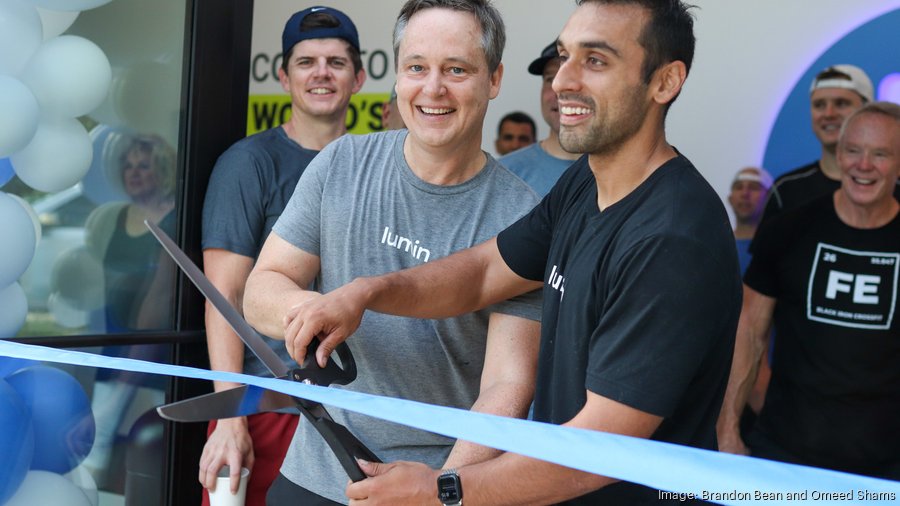Listen to this article 3 min
Lumin Fitness just opened its first studio and is already in conversations in three to four states and four to five countries about franchise opportunities.
The company opened the studio in Las Colinas Sept. 9 and wants to partner with domestic and international franchisees who are passionate about fitness and have previously run a franchise. The fitness brand likens itself to a software as a service concept where franchisees can focus on finding the best locations, and the company will provide the content and programming via its technology.
“We had been talking about how to grow this brand and do it where you're providing a franchisee with a powerful business model that's based around the pain points that we saw in franchising,” Lumin Fitness Chief Development Officer Craig Sherwood said in a recent interview. “Labor is not getting any cheaper. How do you design a format where the labor investment is going to be significantly less then what other concepts have out there? We're providing franchisees a turnkey business model where they can focus on just running their business, and all of the content and the technology is handled for them.”
The Las Colinas location will be the fitness concept’s only corporate-owned studio. The rest of the company’s expansion will be through franchising, a model Lumin CEO and co-founder Brandon Bean knew from the start he wanted to employ.
While technology can replace a lot of what happens in a group fitness setting, Bean doesn’t believe it can replace the accountability, energy and community that comes from the human element. He knew small business leaders would know their local territories much better than the company could and be better at building a local fitness community.
The 2,600-square-foot facility has custom-built motion tracking and object detection technology that knows who each member is, where they are, how they’re moving, how many reps they’ve done and can give visual and audio form feedback.
Bean and his team have spent nearly four years developing the technology-based fitness concept, but the product is not and will never be complete.
The brand’s first studio will have its initial set of technology features, and the company has an active pipeline it plans to release in the future. Bean also sees opportunities for Lumin Fitness to apply its software programs to other verticals such as professional sports.
“We're counting your reps for you,” Bean said. “We're giving you form feedback to make sure you're moving safely and effectively. We're allowing you to interact with the space. We know that in the last round you did nine of these movements, and that's shown up on the screen for you. When (that next round) comes around, you're going to be motivated to at least beat what you did in that last round.”
From big-box solutions with buffet-style pricing models that offer access to weights, group classes, swimming and sometimes child care to high-volume low-priced clubs with simply weights and cardio equipment and high-energy group fitness experiences like SoulCycle and CrossFit, Bean has seen the industry evolve along different spectrums.
After leaving Gold’s Gym in 2019, he wanted to spend the next phase of his career innovating the boutique-style fitness experience. He saw younger consumers migrating towards the smaller format training style and wanted to create a fitness experience based on technology.
Alongside those fitness-specific trends, technology infiltrated the industry, especially during the pandemic, with the introduction of at-home fitness devices like Peloton and Tempo that provide consumers with a hyper-personalized experience. But that technology solution often lacks the energy and community members get from an in-person training session.
“What we're looking to do at Lumin Fitness is combine in-person brick-and-mortar experience [with the] hyper-personalized gamified experience,” Bean said. “Those elements are important because they create that motivation for the consumer to keep coming back. What we're trying to do is leverage the addictive properties of technology to get people addicted to moving.”
The fitness concept initially targeted traditional fitness studio consumers and digital-natives who were born with a smartphone in their hands and typically expect a tailored-retail experience. But Lumin Fitness found the brand also appeals to older consumers who like the dimly lit studio that provides members with their own station in a group environment.
The difficult job Lumin Fitness now has is educating consumers on its new concept.
“This is a concept that doesn't exist,” Bean said. “When you try to explain it to people, they don't have an idea of what this experience is. Once people come in, they join. They understand it, but it's getting in front of those consumers and having them take a chance on a new concept.”
Companywide revenue 2021
| Rank | Prior Rank | Company |
|---|---|---|
1 | 1 | Ben E. Keith Co. |
2 | 2 | Murex |
3 | 3 | Austin Industries |





